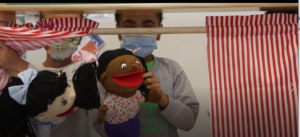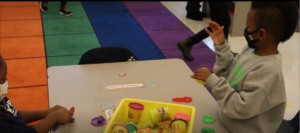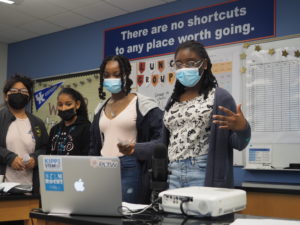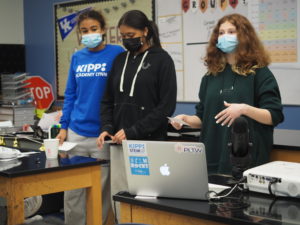(KIPP MA) After a year of virtual learning, re-imagining the 2021-2022 school year at KIPP MA became a priority for both the Executive Leadership and the Teaching and Learning Teams. In planning the return to fully in-person learning, the core values of a KIPP classroom remained the same: a joyful and rigorous learning, teachers and families in partnership with one another for student success, and tools in place to help students and teachers transition back into in-person learning.The foundations of a KIPP education remain the same, but the approach to engage our students in content shifted to meet our students where they are.
“Going from remote learning to re-entering into the classroom, we had the opportunity to say ‘where are the places that we want to disrupt and think about learning in a different way?’” says KIPP MA’s Teaching Fellows Program Director and one of the leaders implementing Play Based Learning, Laura Malley.
Re-imagining school did not mean that learning took the back seat. In fact, it was quite the opposite. When practiced and implemented successfully, Play Based and Project Based Learning both teaches students core content and skills, while also allowing students to engage in the content in an impactful way. These approaches allow students to apply social and academic skills from all content areas in a meaningful project or through play.
So, what exactly is Play Based Learning?
Play Based Learning is the practice of incorporating free and guided play into the school day. Though it is most commonly practiced in early elementary classrooms, research shows that play has a positive impact on a child’s social development, mental well being, and can improve language and communication skills.

“We were deeply concerned about our students, particularly our youngest students who were either returning to school or coming to school for the first time since the pandemic began. For years the research has indicated Play-Based Learning is beneficial for this age group. In light of the circumstances, we felt obligated that students be supported academically, socially, and emotionally during their learning experience.” says Coretta Martin, KIPP MA’s Chief Academic and Strategy Officer.
The Play Based Learning Pilot Program at KIPP MA invited Kindergarten and First Grade teachers to block out time in their classroom schedule to allow students a “play block”, or as some teachers refer to it, a “creative block”. During this time, students have the opportunity to choose their own centers, like art, movement, sensory exploration, blocks or dramatic play. The goal of Play Block is exactly what it sounds like: letting students practice and deepen their social and academic skills through playing.

Play allows students to apply their learning in fun and meaningful ways, whether they are practicing geometry by building 2-D and 3-D shapes from PlayDoh and toothpicks, using their reading and writing skills to create a menu for their pretend restaurant, or becoming engineers by building the tallest block tower.
Right now, The Play Based Learning pilot is implemented in Kindergarten and First Grade classes, but the pilot will continue to expand.
Project Based Learning: A Learning Method to Enhance Student Engagement
As students headed back to the classroom, KIPP MA teachers were focused on how to make the classroom more inclusive and engaging. This included meeting students where they are and also giving them opportunities to learn differently based on their own strengths, interests, and passions.
Project Based Learning (PBL) is centered around using student-led projects to learn core curriculum. With high school seniors across the country admitting that they’ve lost engagement in school (a staggering 77%, to be exact), PBL is a learning modality that can help increase engagement while students are learning core standards.

“We’ve all done projects in our lives as students. The difference is that in Project Based Learning, students learn the content of material through doing the project. It’s not just something you add onto the end of a unit, the project is the method you’re using to teach the material,” explains Jay Galbraith, Director of Academics (Secondary Science).
Over summer 2021, KIPP MA’s Teaching and Learning team, along with teachers across the region who volunteered to take part in the first year of the pilot program, gathered in a training session with PBL Works to begin planning and learning how to implement PBL into the classroom. Among those teachers involved was Julia Kostro, an 8th grade science teacher at KIPP Academy Lynn. It was at this professional development that Julia planned her first PBL unit. The unit challenged students to identify a community health problem in the Lynn community and work on finding possible solutions to the problem. At the end of the unit, the students presented their findings to volunteer public health experts via Zoom who provided live feedback and participated in a Q&A with the students.

“Science can be objectively hard for students to get into,” Julia says, “This project gave students the opportunity to do scientific research, to come up with a grant proposal, and to develop a program based on scientific knowledge. These are all practices of science that students don’t always get to do in the classroom.”
What’s Next?
While both Play Based Learning and Project Based Learning are still in their pilot year at KIPP MA, teachers and students are already identifying how beneficial it is to their everyday classroom experience. We plan on taking the lessons we learn, as well as feedback from both students and families, to improve PBL and Play Based Learning for next year and beyond. Specifically, or Project Based Learning, the goal is to have all KIPP MA teachers formally trained on implementing PBL into their curriculum by year four, while Play Based Learning works to expand what play means in each individual classroom.